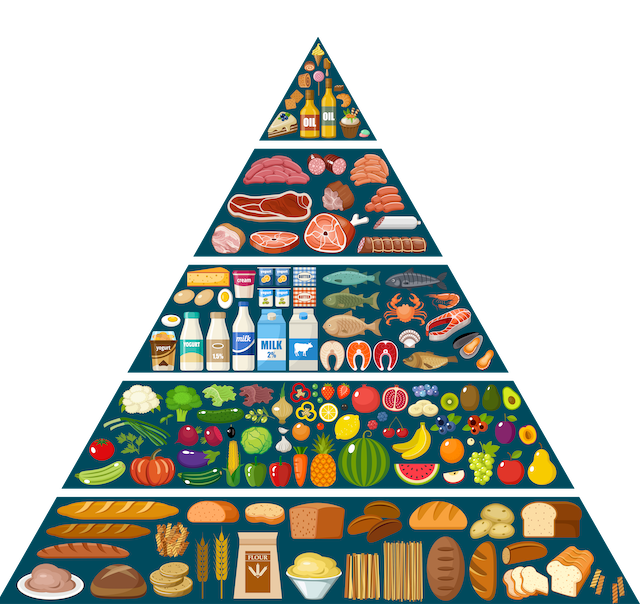
The Food Pyramid: A Deceptive Legacy
or an Outdated Guide?
In 1992, the USDA launched the Food Pyramid to help Americans understand basic nutrition. It suggested eating a foundation of grains, followed by fruits and vegetables, with proteins and dairy in smaller portions—and fats and sweets used sparingly.
On the surface, it seemed like an easy-to-follow guide. But as science evolved, so did our understanding of how nutrition actually works. The pyramid has since come under fire for oversimplifying complex dietary needs—and possibly contributing to long-term health issues.
What Went Wrong With the Food Pyramid?
Despite good intentions, the Food Pyramid painted with too broad a brush. It recommended large servings of carbohydrates—without distinguishing between complex whole grains and refined, processed starches.
According to research published in the American Journal of Clinical Nutrition (2018), diets high in refined carbohydrates are linked to obesity and related metabolic conditions. Yet the original pyramid grouped all grains together, which misled many into thinking bagels and white rice were health foods.
On top of that, the model indirectly discouraged healthy fats—like those from avocados, nuts, and olive oil—causing people to choose low-fat but sugar-laden foods instead.
The result? A generation of Americans ate more sugar, fewer whole foods, and ended up with higher rates of chronic illness.

The Shift to Personalized Nutrition
One major lesson from the Food Pyramid’s fall from grace: nutrition isn’t one-size-fits-all.
Thanks to growing knowledge in epigenetics, gut health, and metabolism, we now know that personal factors—like age, activity level, hormone health, and even genetics—should influence what we eat.
This realization fueled the rise of more flexible and evidence-based tools like MyPlate and the Dietary Guidelines for Americans. These modern approaches encourage balanced meals built around whole foods, not rigid servings.
You don’t need a triangle to tell you what to eat—you need tools that reflect real-life needs.

A Smarter Way to Nourish Your Body
Here’s a foundation to help you build balanced meals based on current science:
✅ Macronutrients (Per Day)
- Carbs: 225–325g from whole grains, fruits, and vegetables
- Protein: ~46g for women, ~56g for men from lean meat, legumes, dairy, and nuts
- Fats: 44–78g from healthy sources like olive oil, seeds, fish, and avocados
Vitamins You Need
- Vitamin A: 700–900 mcg (carrots, sweet potatoes)
- Vitamin C: 75–90 mg (berries, citrus, bell peppers)
- Vitamin D: 600–800 IU (sunlight, fortified foods)
- Vitamin E & K: From nuts, greens, and oils
- B-Complex: Found in whole grains, eggs, and meats
Mineral Must-Haves
- Calcium: 1000–1200 mg (dairy, greens)
- Iron: 8–27 mg based on gender and pregnancy (meat, spinach, lentils)
- Magnesium: 310–420 mg (nuts, whole grains)
- Potassium: 2500–3000 mg (bananas, potatoes)
- Zinc & Selenium: Red meat, legumes, seafood
Water + Fiber
Fiber: 25g (women), 38g (men) from fruits, veggies, and grains
Water: 2.7 liters (women), 3.7 liters (men)
How to Put It All Together
Instead of relying on an outdated pyramid, follow these simple steps for daily nutrition success:

- Build Balanced Meals: Start with whole grains, lean protein, and colorful vegetables.
- Snack Smart: Choose nuts, yogurt, or fruit over processed options.
- Hydrate Often: Carry water with you and sip throughout the day.
- Avoid Empty Calories: Cut back on sugary drinks and ultra-processed snacks.
- Consult a Professional: Get personalized guidance for your age, health status, or goals.
Rethinking the Pyramid: The Science Backs It Up
- Here’s what the research says:
- Carbohydrates & Obesity: A 2018 AJCN study found that diets rich in refined carbs and added sugars are tied to obesity—issues the Food Pyramid ignored.
- Glycemic Index & Weight Gain: The Journal of Nutrition (2013) found that high-GI foods increase risk for weight gain and blood sugar issues.
- Sugar & Heart Health: According to the American Heart Association, added sugars contribute to heart disease and obesity.
- Refined Carbs & Metabolic Health: A 2015 Nutrition & Metabolism study linked high refined-carb intake with poor metabolic outcomes.
FeedMeFood: Helping You Rethink Nutrition
At FeedMeFood, we’re passionate about nutrition that’s rooted in evidence—not outdated trends. We believe in equipping you with tools that fit your life, your body, and your goals.
- 🎯 Check out our free tools:
- Meal Planner – Streamline your week with balanced, customizable meals
- Pantry Inventory App – Track your essentials and avoid waste
- Fuel Board Recipes – Get easy, nutrient-rich meal ideas your whole family will enjoy
- Source Code Food – Our nutrition roadmap, grounded in science
- 👉 Subscribe for updates, recipes, and wellness tips.
- Your journey to better health starts with knowledge and action—and we’re here to support you every step of the way.

The Food Pyramid had its moment, but that moment has passed. With deeper insight into how our bodies work, we’re better equipped to make smarter, more personalized food choices.
It’s time to embrace a flexible, informed, whole-food approach. One that values science over slogans—and real meals over rigid models.
Let’s ditch the pyramid and build something better, together.